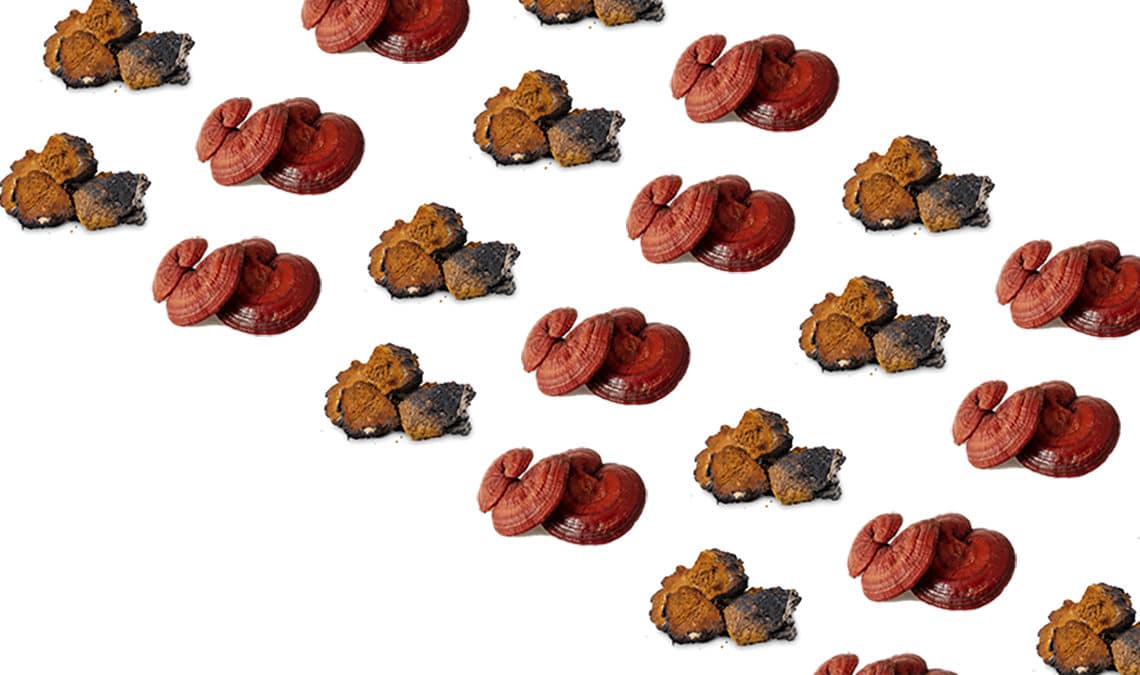
The Best Chaga And Reishi Mushroom Supplements At A Glance
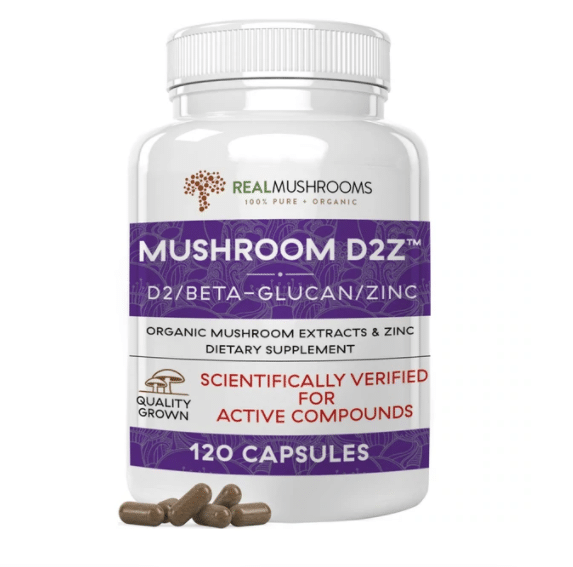
Best Chaga And Reishi Supplement
Real Mushrooms Mushroom D2Z
This supplement is a Reishi and Chaga blend with zinc and vitamin D. It’s made from certified organic mushrooms and has one of the highest concentrations of Beta-(1,3)(1,6)-glucans for both mushrooms (at least 35% for Reishi and at least 8% for Chaga).
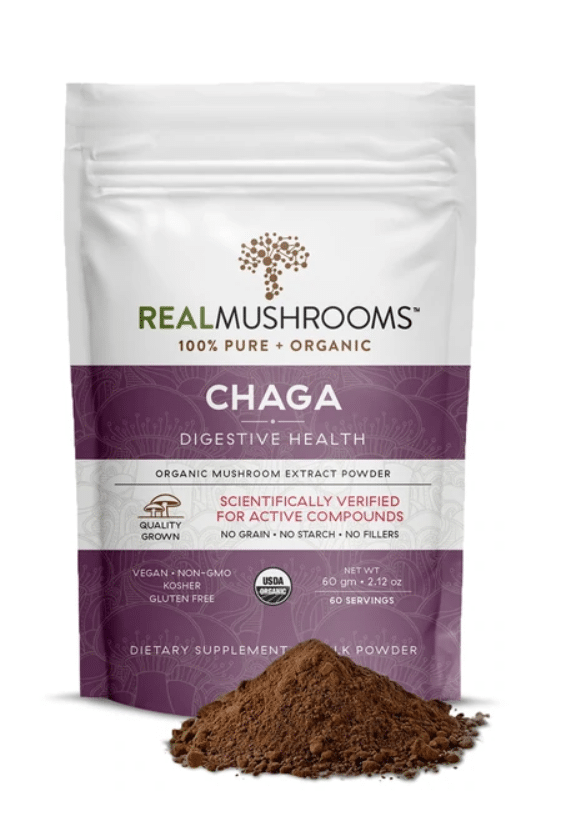
Best Chaga Mushroom Powder
Real Mushrooms Organic Siberian Chaga Extract Powder
This supplement is USDA Certified Organic and hot water extracted from 100% Siberian Chaga. You can expect this product to contain 8% or more Beta-glucans.
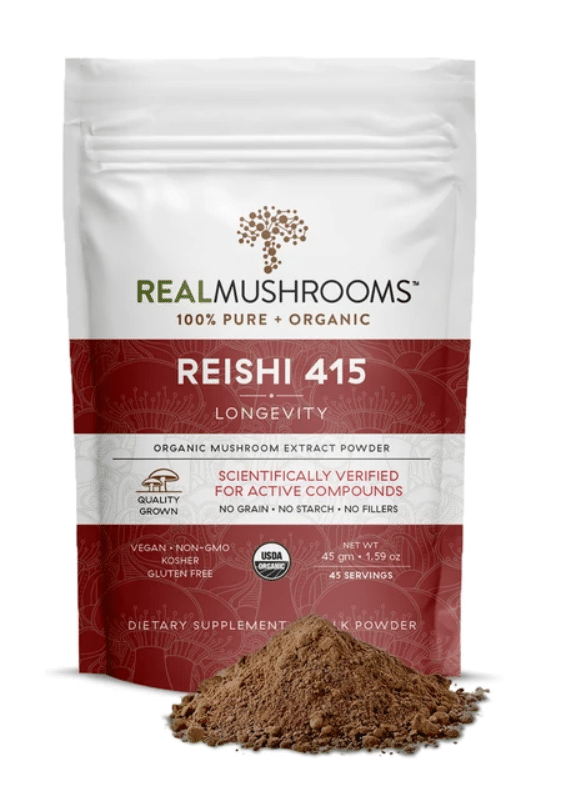
Best Reishi Mushroom Powder
Real Mushrooms Organic Reishi Mushroom Powder
Made from 100% organic Reishi mushrooms through dual extraction. Contains at least 15% Beta-glucans and 4% triterpenes.
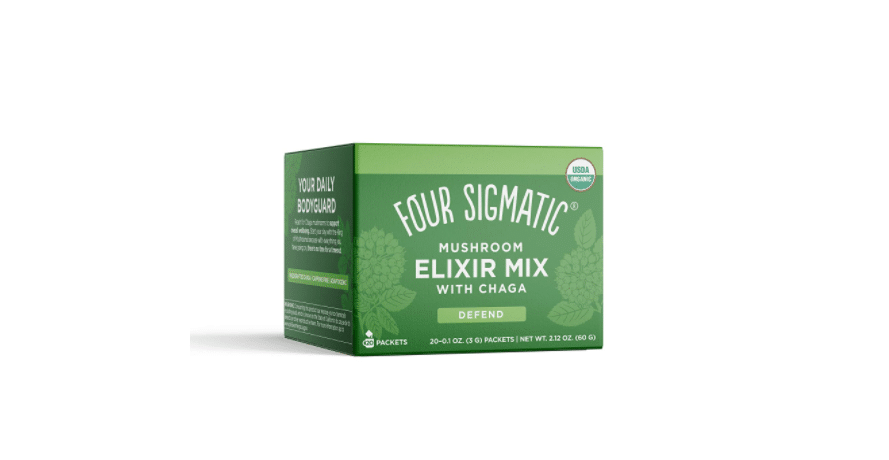
Best Chaga Mushroom Tea
Four Sigmatic Chaga Mushroom Elixir
This elixir contains a mix of organic chaga, organic eleuthero, and organic field mint and rose hips extract. It can easily be mixed with water to create a tea.
Get 10% off using our link!
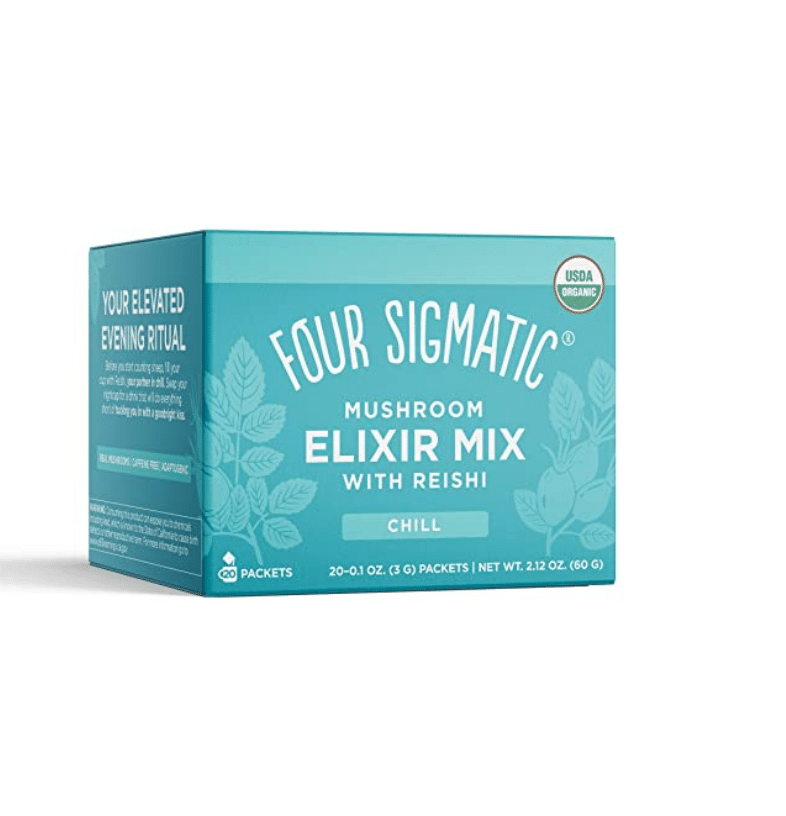
Best Reishi Mushroom Tea
Four Sigmatic Reishi Mushroom Elixir
This elixir contains a mix of organic reishi mushroom, organic tulsi, and organic field mint and rose hips extract and is able to be mixed in easily with water to create a tea.
Get 10% off using our link!
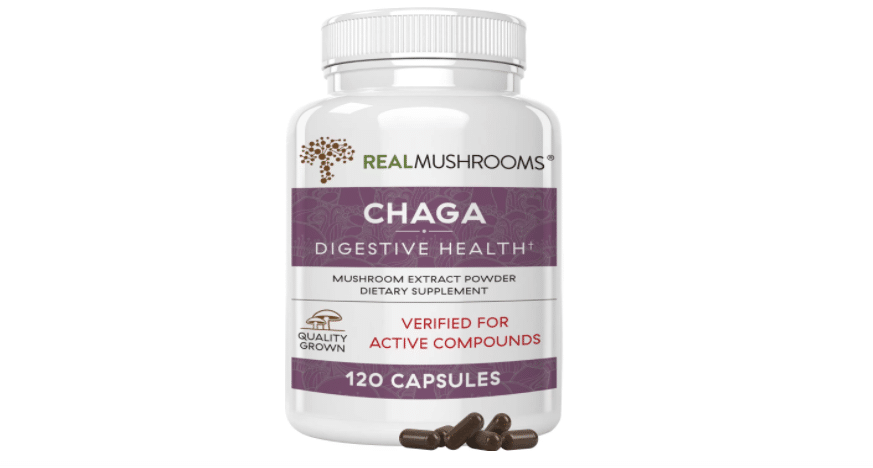
Best Chaga Capsules
Real Mushrooms Organic Siberian Chaga Extract Capsules
Just like its powder version, Real Mushrooms Chaga capsules provide 1,000 mg of Chaga with 8% or more Beta-glucans per serving (2 capsules).
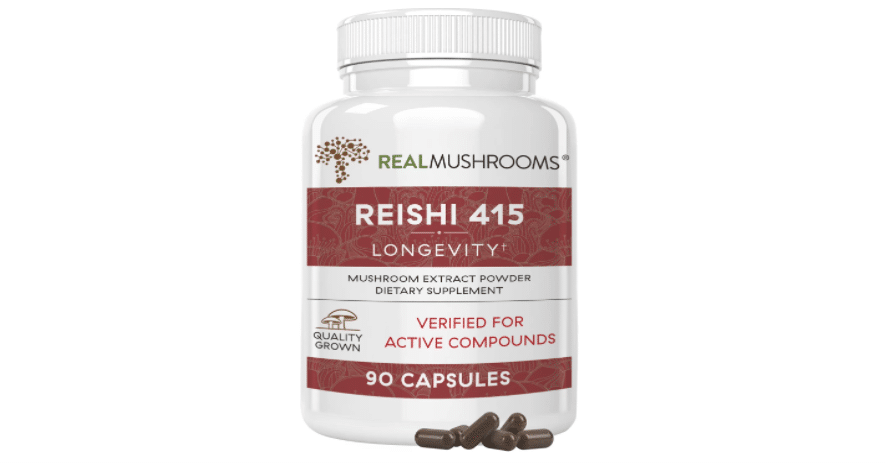
Best Reishi Capsules
Real Mushrooms Organic Reishi Mushroom Capsules
Just like its powder version, Real Mushrooms Reishi capsules provide 1,000 mg with at least 15% Beta-glucans and 4% triterpenes per serving (2 capsules).
To most people, mushrooms are either a) a tasty ingredient of (mostly Italian) food, b) a psychedelic drug, or c) poisonous things that grow on your front lawn and that you have to stop your dog from eating.
There is, however, a fourth class of mushrooms that few people know about: mushrooms that people take for their health. Sometimes referred to as medicinal mushrooms (though they’re no substitute for actual medicine), mushroom supplements, or nootropic mushrooms.
This category includes reishi mushrooms, chaga mushrooms, lion’s mane, and turkey tail mushrooms, among others. Two of those in particular–chaga and reishi–have a fair amount of evidence pointing to health benefits including stress reduction, cancer prevention, and improvements in mood, immune function and cardiovascular fitness. Anecdotally, they may also enhance physical and mental performance.
In this article I’ll review the evidence for two of them in particular–chaga and reishi.
Chaga Vs. Reishi
First off, they’re not the same thing. They’re often lumped together–usually described as closely related, and occasionally even used interchangeably.
Evolutionarily speaking, however, chaga and reishi mushrooms aren’t that closely related at all. They belong to the same class but different orders, which means they’re about as closely related as humans are to non-primate mammals. So when you’re comparing reishi vs. chaga, there are a number of differences to discuss.
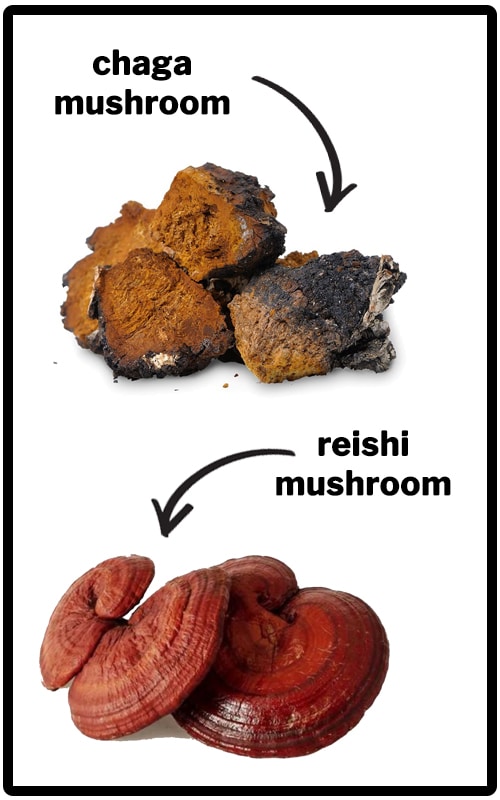
Reishi, also known as lingzhi mushrooms, have the scientific name ganoderma lingzhi. They are red on the top and often white on the underside and around the edges. Reishi mushrooms are found throughout east Asia, and in Japan, where they grow on old-growth trees and decaying logs.
According to the book Adaptogens: Herbs for Strength, Stamina, and Stress Relief, “Reishi is relatively rare in the wild, and throughout the history of China, its use was restricted mostly to the emperor, his court, and the upper classes.”
Reishi was traditionally prepared as a team and indeed, it only grows on two or three out of every ten thousand old-growth or dead trees; in modern times it is farmed, not wild-gathered.
Chaga mushrooms, scientific name Inonotus obliquus, grow in birch forests throughout northern Asia and Europe, particularly in Russia. Its name, in fact, comes from Russian.
Like reishi, chaga was traditionally ground into a fine powder and brewed as a tea. It was traditionally used for immune support and overall health. Unlike reishi, it isn’t particularly rare in the wild, so its use wasn’t restricted to the upper class. Like reishi, it is also cultivated in modern times. However cultivated chaga shows reduced levels of the active ingredients compared to wild-grown chaga.
In modern times, both mushrooms are sold as adaptogens–herbs that help your body to adapt to stress. As we’ve explained before, that’s a rather questionable category, although herbs that reduce stress definitely exist.
In fact they each have quite a few potential health benefits, although the research on most of them is a bit thin.
Medicinal Mushrooms? The Benefits Of Reishi And Chaga
There are quite a few studies on chaga and reishi mushrooms, but many have been done in China and Russia, and not all of those have been published in English. Of the ones that are available in English, there seem to be more on reishi than on chaga.
Adaptogenic Mushrooms: Mushrooms as Stress, Anxiety and Fatigue Reducers
Although adaptogenesis–i.e. stress management–tends to be the most-touted benefit of chaga and reishi mushrooms, it’s not necessarily the most-researched or best-supported use for them. That is, in the research–there are few studies supporting reishi for anxiety, and none that we could find about chaga.
One study found that reishi mushroom extract reduced fatigue in breast cancer patients. Since the patients were undergoing drug therapy for their cancer, one can’t be sure whether there were interaction effects that would not be present in other patients.
Another study found no anxiolytic effect in mice. A different study, however, found mixed results with rats–two different tests of anxiety were conducted, and reishi extract produced a significant improvement in anxiety in one test but not the other.
Anecdotally, people report anxiolytic benefits from both reishi and chaga. The thing with anecdotes though is that they’re not placebo-controlled, and there’s no telling how representative they are of most people’s experiences.
That’s about it as far as direct effects on stress, anxiety and fatigue are concerned. However, there is somewhat better evidence for the related areas of mood and well-being.
Mushrooms Improve Mood and Well-Being
That same study on rats found anti-depressant effects for reishi mushroom extract. But what about humans?
The same breast cancer study mentioned earlier also noted improvements in mood and subjective well-being. Similar improvements have been noted in men with urinary tract problems, and in men and women with neurasthenia.
What about chaga mushrooms? As of yet, there seems to be no research on mood effects.
Cancer And Immunity
Cancer prevention and treatment, and immune support more broadly, is perhaps the best-studied potential benefit of reishi and chaga mushrooms.
Continuous intake of chaga mushroom extract was found to slow tumor progression in mice. It did so at least partly by inhibiting vascularization–the growth of new capillary vessels to supply nutrients to the tumor.
Chaga mushrooms contain betulin and betulinic acid (not the same chemical, despite their names), both of which are known to have anti-cancer effects. Chaga mushrooms also promote the activation of macrophages–a kind of white blood cell–in addition to suppressing tumor growth in mice.
In a study of Chinese cancer patients, lingzhi mushroom extract improved a variety of immune function markers, including interleukin, interferon, CD56+ cells, and natural killer cells. Other studies, primarily in China, have replicated these results.
A 2010 Japanese study found that reishi extract suppressed the growth of colorectal adenomas–pre-cancerous growths in the colon.
All in all, the anti-cancer activities of both chaga and reishi seem quite well-supported, but the precise details are murky. It’s not clear, for instance, what the optimal dosage would be, nor which specific types of cancers are affected, since different cancers work via different mechanisms.
There is also substantial evidence for broader immune-boosting benefits of reishi and chaga and mushrooms. However, this still needs to be explored outside the context of cancer patients.
Mushroom Effects On Cardiovascular Health
One study found that reishi mushrooms increased “good” HDL cholesterol and lowered triglycerides in men. A different study, also in men, found no effect on total cholesterol levels.
Chaga might be even more promising than reishi for cardiovascular health. It lowers LDL and raises HDL cholesterol. Chaga also lowers triglyceride and total cholesterol levels, while acting as an antioxidant. In short, it seems to be quite good all-around for cardiovascular health.
Mushrooms As Nootropics And Physical Performance Enhancers
Chaga and reishi mushrooms (reishi more so than chaga) have sometimes used by biohackers, athletes and nootropics buffs for cognitive and physical performance enhancement. Thus far, this usage has a fair amount of anecdotal evidence, but is backed by virtually no research.
The closest thing to a performance-enhancing effect shown in human research has been a decrease in fatigue in cancer patients.
In vitro, reishi extract seems to enhance neuronal survival and promote neurogenesis. This has yet to been seen in in-vivo (live human) studies.
One mouse study found that a reishi mushroom extract failed to enhance the swimming capacity or endurance of mice.
Chaga extract shows somewhat more promise as a physical performance enhancer. One mouse study found that chaga extended swimming time to exhaustion, increased muscle and liver glycogen content, and reduced lactic acid and urea buildup during exercise.
Beyond that, users report a variety of benefits from these two mushrooms, including better mood, focus, productivity, athletic performance and even a reduction in altitude sickness. These reports are scattered and inconsistent, and should be treated with a large deal of skepticism until they’re backed by studies.
Chaga and Reishi Mushroom Dosage and Side Effects
Very few side effects have been reported for either reishi or chaga mushrooms.
Chaga mushrooms have high levels of oxalates, so ingesting high doses for long periods of time can be harmful. This is rare, but in at least one case, a Japanese woman who took 4-5 teaspoons of chaga powder a day for 6 months suffered kidney damage as a result, requiring dialysis.
Chaga mushrooms are usually recommended to be dosed at 3.6 grams/day or less of whole mushroom powder. This is one to two teaspoons of chaga powder–far lower than the woman in that study was taking. This dosage should also be split into 2-3 daily doses. And just to be on the safe side, it’s probably best to take a week off from chaga mushrooms every month or two, in addition to drinking a lot of water to aid the kidneys.
Reishi mushrooms seem to have an even more favorable side effect profile. Doses of up to 1.44 grams/day of extract–equivalent to 13.2 g of whole mushrooms–produced no signs of toxicity in blood, liver or cardiac parameters in humans. Also in rats, dosages of 5 grams per kg of bodyweight seem to be perfectly safe– equivalent to hundreds of grams a day of whole mushroom in humans.
Two cases have linked reishi mushroom consumption to liver damage, however. Both involved Chinese women taking powdered reishi extract for months at a time; the first suffered from fatigue and loss of appetite, while the other died.
Because both women were studied only after the fact, the dosages they took were not determined. It is known that both consumed reishi for years without effect, suffering from liver damage only after switching to a new, powdered formulation. Neither case proved causation, and it is entirely plausible that the new mushroom powder they switched to was tainted with something else.
The most popular reishi mushroom dosage is 5.2 grams a day of powdered mushroom extract, equivalent to 20.8 grams a day of whole mushroom, split into three daily doses.
Given the evidence that up to 13.2 grams of whole mushroom is safe for at least a month, and much higher dosages are safe in rats, this dosage seems safe in the short term, but one should be less confident about longer-term safety. Out of an abundance of caution, we advise treating this dosage as a maximum, and taking a week off from reishi mushrooms after every month of use.
How To Take Chaga And Reishi Mushrooms: Mushroom Tea Vs Powder Vs Pills
Chaga and reishi mushrooms are available as whole mushrooms, powdered extracts, orin teas or capsules made from powdered extracts. There is no good evidence for which form is more bioavalable, so you can go with whatever form you find most convenient.
What does chaga tea taste like? Mushroom powder and teas have a bitter taste, which you may or may not enjoy. Mixed into coffee, the taste of mushroom powder usually isn’t very noticeable, especially if you add creamer, sugar, cinnamon, or other typical coffee additives.
Capsules are a good, convenient option for chaga mushrooms, but not for reishi mushrooms. Because the daily dose of reishi mushrooms is quite high– 5 grams of extract or 20 grams of whole mushroom powder– it’s not practical to encapsulate reishi mushrooms, and we find reishi mushroom capsules to be badly underdosed in general.
The one thing that is important here is that you buy extracts that are made using a hot water extraction process, and not an ethanol extraction process. Most chaga and reishi products do indeed use hot water extraction, but make sure to research your sources and read the fine print. Again, our view is that the best chaga extract and the best reishi mushroom extract powder are going to be extracted using hot water, not harsh chemicals.
The Best Chaga and Best Reishi Mushroom Products
Best Chaga And Reishi Supplement

Organic Mushroom Extract Blend
Real Mushrooms Mushroom D2Z
Mushroom D2Z is a blend of organic extracts of Reishi and Chaga and also contains zinc and vitamin D. This combination of mushrooms and nutrients is designed to provide an immune system boost and improve cognitive function.
Each serving of 2 capsules provides 215 mg of Reishi with 35% or more Beta-(1,3)(1,6)-glucans, 215 mg of Chaga with 8% or more Beta-(1,3)(1,6)-glucans, 50 mcg of vitamin D2, and 30 mg of zinc.
Best Chaga Mushroom Powder

Organic Mushroom Extract Powder
Real Mushrooms Organic Siberian Chaga Extract Powder
This product contains organic 100% Siberian Chaga that’s sourced from hot water extraction. Each serving of 1/2 tsp provides 1,000 mg of Chaga with 8% or more Beta-glucans.
This Chaga extract powder is certified kosher, gluten-free, non-GMO, and vegan and is free of added starch, mycelium, and grains.
Best Reishi Mushroom Powder

Organic Mushroom Extract Powder
Real Mushrooms Organic Reishi Mushroom Powder
This product contains 100% organic Reishi mushrooms that are made from dual extraction. Each serving of 1/2 tsp contains 1,000 mg with at least 15% Beta-glucans and 4% triterpenes.
This product is certified kosher, gluten-free, non-GMO, and vegan and is free of added starch, mycelium, and grains.
Best Chaga Mushroom Tea

Best Chaga Mushroom Tea
Four Sigmatic Chaga Mushroom Elixir
This elixir contains a mix of organic chaga (1,500 mg per serving), organic eleuthero, and organic field mint and rose hips extract.
Each box comes with 20 packets of powder mix and it is recommended to consume 1-2 per day.
This product is caffeine-free, non-GMO, USDA organic, and gluten-free and is easily mixed with water to create a tea.
Get 10% off using our link!
The Best Reishi Mushroom Tea

Most Popular
Four Sigmatic Reishi Mushroom Elixir
Four Sigmatic may be best known for its mushroom coffee, but it also produces mushroom elixirs as well. This elixir contains a mix of 1,500 mg of organic reishi mushroom along with organic tulsi and organic field mint and rose hips extract to improve sleep quality and reduce stress.
Each box comes with 20 packets of powder mix and it is recommended to consume 1-2 per day.
This product is caffeine-free, non-GMO, USDA organic, and gluten-free and is easily mixed with water to create a tea.
Get 10% off by using our link!
Best Chaga Capsules

Organic Mushroom Extract Capsules
Real Mushrooms Organic Siberian Chaga Extract Capsules
Just like its powder version, Real Mushrooms Chaga capsules provide 1,000 mg of Chaga with 8% or more Beta-glucans per serving (2 capsules).
These capsules are vegan-friendly and each bottle contains 120 capsules, or 60 servings, total.
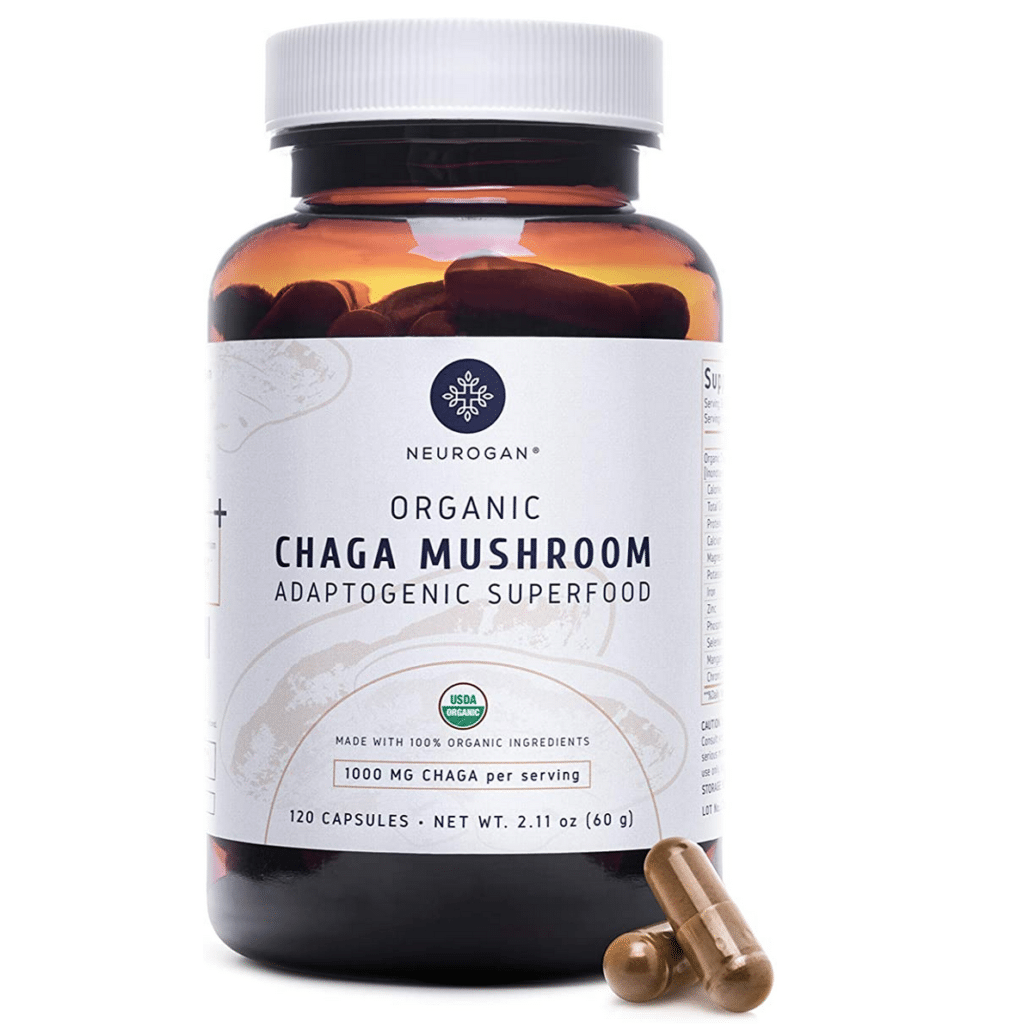
Another great option for chaga capsules
Neurogan Chaga Mushroom Capsules
These organic chaga capsules contain 4:1 extract and provide 1 gram per serving (2 capsules). The chaga in this product is farm-grown in Canada and is rich in chromium for added glucose control.
Best Reishi Capsules

Organic Mushroom Extract Capsules
Real Mushrooms Organic Reishi Mushroom Capsules
Just like its powder version, Real Mushrooms Reishi capsules provide 1,000 mg with at least 15% Beta-glucans and 4% triterpenes per serving (2 capsules).
These capsules are vegan-friendly and each bottle contains 120 capsules, or 60 servings, total.
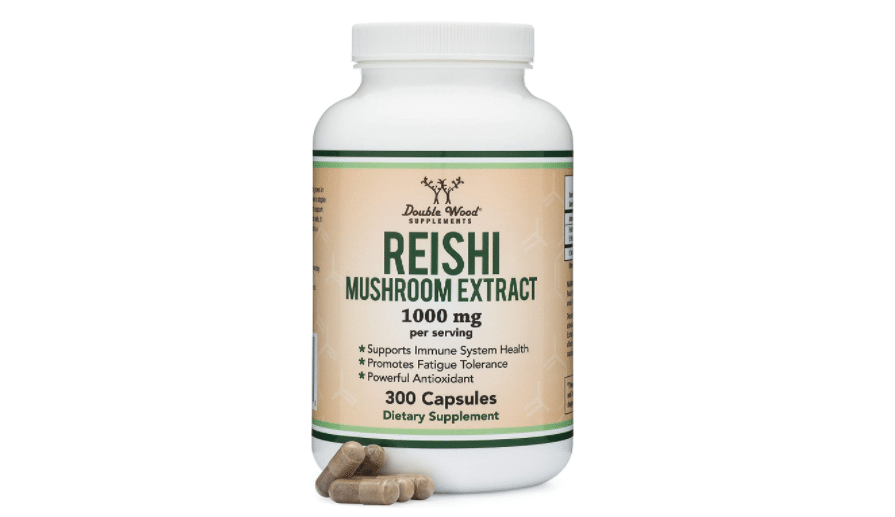
Great Value Mushroom Extract Capsules
Double Wood Supplements Reishi Mushroom Extract Capsules
Each bottle of Reishi Mushroom Extract capsules by Double Wood Supplements contains 300 capsules, or 150 servings total.
Each serving provides 1,000 mg of 4:1 extract that’s composed of the entire fruiting body and mycelium.
These capsules are vegan-friendly and free of soy and gluten.
Read Our Review On The Best Lion’s Mane Supplements.
Editor’s note: we are regularly updating this review. If you see any problems, weird interpretations of the data, or just want to say hi, please reach out to hello@the-unwinder.com.
